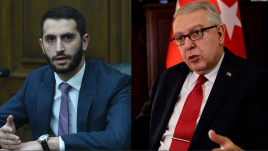The Armenian Foreign Ministry said the talks took place “in a positive and constructive atmosphere,” with the two sides exchanging “preliminary views regarding the normalization process.”
“The parties agreed to continue, without preconditions, negotiations aimed at a full normalization,” it said in a statement. “The date and venue of their second meeting will be decided in due time through diplomatic channels.”
The Turkish Foreign Ministry issued an identical statement on the meeting that lasted for about two hours.
Ankara was represented in the talks by Serdar Kilic, a veteran diplomat who served as Turkey’s ambassador to the United States from 2014-2021. Kilic’s 31-year-old Armenian opposite number, Ruben Rubinian, is a deputy speaker of the Armenian parliament.
The Armenian Foreign Ministry spokesman, Vahan Hunanian, on Thursday cautioned against excessive expectations from the first face-to-face meeting of the two envoys.
“This will be an introductory meeting,” Hunanian said in written comments. “It’s hard to expect tangible results from the first meeting, but it will mark the start of the [normalization] process.”
Rubinian met with Russia’s Deputy Foreign Minister Andrei Rudenko ahead of his talks with Kilic. They discussed the Turkish-Armenian dialogue, according to the Foreign Ministry in Yerevan.
Russian Foreign Minister Sergei Lavrov reaffirmed on Friday Moscow’s support for that dialogue. Lavrov said Turkish-Armenian negotiations will contribute to peace and stability in the South Caucasus.
The United States and the European Union have also hailed the negotiations.
Ankara has for decades refused to establish diplomatic relations with Yerevan and kept the Turkish-Armenian border closed out of solidarity with Azerbaijan. It provided decisive military support to Baku during the 2020 Armenian-Azerbaijani war over Nagorno-Karabakh.
In recent months Turkish leaders have made statements making the normalization of Turkish-Armenian relations conditional on Armenia agreeing to open a land corridor that would connect Azerbaijan to its Nakhichevan exclave. They have also cited Baku’s demands for a formal Armenian recognition of Azerbaijani sovereignty over Karabakh.
Turkish Foreign Minister Mevlut Cavusoglu has repeatedly made clear that Ankara will continue to coordinate its Armenian policy with Baku.
Cavusoglu’s Armenian counterpart, Ararat Mirzoyan, complained last November that the Turks are setting “new preconditions” for establishing diplomatic relations and opening the border with Armenia.
Armenian opposition leaders have accused Prime Minister Nikol Pashinian of being ready to accept those preconditions. Pashinian’s political allies have denied that.
Hunanian, the Foreign Ministry spokesman, insisted on Thursday that Yerevan continues to stand for an unconditional normalization of Turkish-Armenian ties.
https://www.azatutyun.am/a/31654649.html






